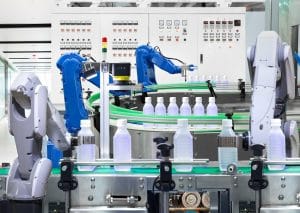 While every industry has benefited from the improved efficiency and productivity provided by modern heat exchangers, the food and beverage industry has had some of the most impactful benefits. Like other companies, those that handle food and beverage production rely heavily on advanced forms of technology to make their processes safer, faster, and more efficient. Also, as with most other industries, this reliance on technology has also generated a growing need for more efficient and cost-effective methods of electrical thermal management. For many companies, heat exchangers have proven the ideal solution, allowing food and beverage companies to enhance their electrical cooling systems without compromising in any other areas of production.
While every industry has benefited from the improved efficiency and productivity provided by modern heat exchangers, the food and beverage industry has had some of the most impactful benefits. Like other companies, those that handle food and beverage production rely heavily on advanced forms of technology to make their processes safer, faster, and more efficient. Also, as with most other industries, this reliance on technology has also generated a growing need for more efficient and cost-effective methods of electrical thermal management. For many companies, heat exchangers have proven the ideal solution, allowing food and beverage companies to enhance their electrical cooling systems without compromising in any other areas of production.
Using heat exchangers for electrical cooling
Cooling electrical control panels and other enclosures was one of the first common uses for heat exchangers. Their greatest benefit was the ability to help companies cut their reliance on clunky, cumbersome, and costly solutions such as air conditioners and air compressors, which were once the only options for electrical cooling. Even today, heat exchangers offer more advanced methods of preventing electrical overheating, such as transferring electrical waste heat instead of trying to cool it down. The energy and cost savings associated with heat exchangers help food and beverage companies keep their technologies properly cooled in a consistent and reliable manner, and at minimal cost.
The other thermal management concerns companies face
Because of their reliance on all forms of technology, food and beverage companies benefit greatly from electrical cooling with heat exchangers. However, electrical cooling is only one of many different thermal management needs that food and beverage companies face. In addition to handling electrical cooling needs, heat exchangers can also be used to help keep temperatures precisely controlled for a number of other important processes. That includes pasteurizing products to make them safe for consumption, and storing and packaging products at specific temperatures to maximize their longevity. By reducing the costs associated with these and other thermal management processes, heat exchangers have become essential to food and beverage companies’ overall operations.
How heat exchangers streamline other processes, too
The way heat exchangers approach industry-specific thermal management concerns is the same way they approach electrical cooling – by absorbing and transferring heat within a tightly controlled loop. For electrical cooling, a heat exchanger uses an eco-friendly cooling fluid, such as water, to absorb electrical waste heat, then transfer and dissipate it safely away from electrical components. This same method of heat transfer can be utilized to keep temperatures at specific levels for other processes while minimizing the need for additional heat or HVAC cooling methods.
For more information about heat exchangers for electrical cooling in the food & beverage industry, call Noren Thermal Solutions in Taylor, TX, at 866-936-6736.







